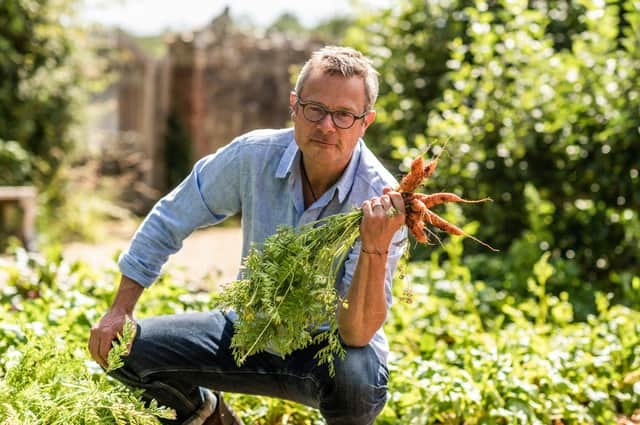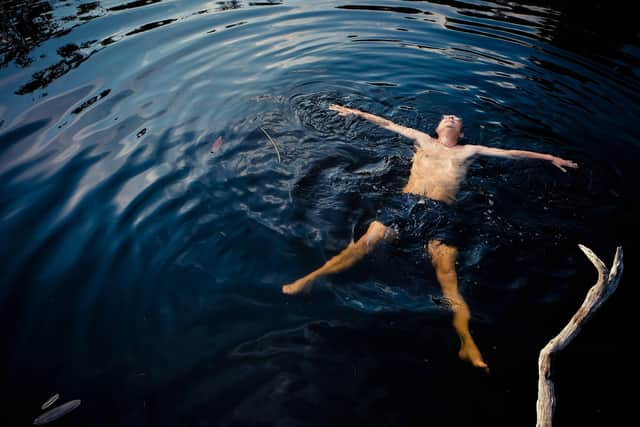Hugh Fearnley-Whittingstall on fasting, goat rearing and finding the positives of lockdown


It’s just past lunchtime and Hugh Fearnley-Whittingstall is already thinking about tonight’s family dinner plans.
“I think we’re going to have cauliflower steaks with cauliflower cheese – my son loves cauliflower cheese,” he tells me on the phone from Devon.
Advertisement
Hide AdAdvertisement
Hide Ad“I’ve just grown the most enormous cauliflower, probably the biggest one I’ve ever grown. I’ve had to stop short of the mentality of somebody growing vegetables for show.”


No stranger to the vegetable patch, of course, the River Cottage founder has enjoyed having more time to tend to his crops during the pandemic, and also took the opportunity to add three farm animals to the fold.
“During the beginning of the spring (last year), we decided to get some goats. We got a nanny for milking and two wethers, which are castrated male goats.
“We reared the boys for meat and we got some lovely milk every day. We made goat kefir and we actually made some lovely goat’s cheese from the kefir, which was really delicious.”
Advertisement
Hide AdAdvertisement
Hide AdStirring up batches of gut-boosting fermented drinks like kefir and kombucha, the writer and broadcaster is practising what he preaches in latest book, Eat Better Forever, which sets out seven principles of a healthy diet, rather than offering a single quick-fix solution, as health gurus often do.
“Newspapers love to jump on a food story or a diet story or a food health thing, and it’s blown up into the new thing or the latest thing,” Fearnley-Whittingstall says.
“Sometimes those things are misleading.”
The author realises that adhering to seven tenets – which include eating a varied diet, as many whole foods as possible, feeding your gut and reducing refined carbs – may not be feasible for everyone, so suggests picking “the ones that you think make sense to you and are going to work for you”.
“The whole point is not to pin everything on a single approach,” he adds.
Advertisement
Hide AdAdvertisement
Hide AdThe final chapter makes the case for mindful eating, something the 55-year-old admits he’s struggled with in the past.
“I’d be happily thinking about other things, while tucking into crisps or eating a sandwich on a shoot, or automatically popping the cork when I get home from work in the evening.
“I’ve learned to manage that by always being more thoughtful – well, not always, because goodness knows this is not about perfection. It’s about being in touch with your thinking about your eating, and therefore about the eating itself.”
Likewise, while the broadcaster has found that intermittent fasting (reducing one’s calorie intake on certain days) has helped him lose weight, he recognises it’s not for everyone.
Advertisement
Hide AdAdvertisement
Hide Ad“If I’m dashing about making a programme, or I’m on my feet all day, if I don’t have something to eat fairly soon in the morning I’m a bit stressed and a bit grumpy,” he says.
“Whereas I find I actually enjoy fasting a little bit when I’m having a quieter time. So I’ve been able to do that quite a bit recently.”
‘Go whole’ – eating more whole foods – is the first principle of the Eat Better Forever approach.
After a TV project slated for shooting was postponed, Fearnley-Whittingstall spent most of 2020 at home in East Devon with his wife Marie and four children (Chloe, 24; Oscar, 21; Freddy, 17; and Louisa, 10).
Advertisement
Hide AdAdvertisement
Hide Ad“It was tense at times because all the kids, including the grown-up ones, were at home for at least the first three months, and that doesn’t normally happens these days apart from Christmas.”
With the River Cottage cookery school and restaurants forced to close due to restrictions, he says the business side of things has been “really tough”.
“We’ve decided not to reopen one of our restaurants, which is really sad.”
But he’s trying to look on the bright side: “At a personal level, I have to say elements have been really amazing. I’ve had amazing time at home with the family, growing (vegetables) and cooking and walking, looking after the goats.
Advertisement
Hide AdAdvertisement
Hide Ad“I’ve made a bunch of recipes, which my son Freddy filmed and we put up as a part of the River Cottage Instagram – stuff like that to keep people engaged and keep in contact with our supporters through these strange times.”
When the great flour shortage of 2020 hit, the cook got to work coming up with a baking alternative.
“It was quite a nifty recipe for chickpea cookies, which seemed to go down quite well, and I still make them because they’re actually really delicious.”
Identifying a gap in his botanical knowledge, he set about photographing wildflowers on his daily walks in the Devon countryside.
Advertisement
Hide AdAdvertisement
Hide Ad“For a couple of months, I was doing a daily wildflower tweet on my Twitter feed, which people seemed to like. I’ve photographed and identified over 170 wild flowers all within two miles of my front door. So that was quite fun.”
One programme he did manage to film during 2020 was a new episode of BBC One show War On Plastic, which was co-presented by Yorkshire-born Anita Rani.
The show had almost been completed prior to Covid, with Fearnley-Whittingstall recording his voiceover “at the beginning of lockdown with my head in a cupboard at home”.
But extra scenes were added when the pandemic resulted in new issues coming to light such as disposable masks turning up in the oceans and shoppers going from decrying plastic-wrapped fruit and veg, to feeling they could be the safer option.
Advertisement
Hide AdAdvertisement
Hide AdA scene in the series captured Rani’s horror when she watches, on film, an octopus emerge from underneath a disposable mask on the ocean floor.
“The idea that the world is filling up with millions or billions of disposable plastic masks, and they’re already in the sea, is just too grim for words,” Fearnley-Whittingstall reflected last August ahead of the programme airing.
Now, with a smidgen of hope (dare we say it) potentially on the horizon in relation to the Covid situation as vaccines are rolled out, Fearnley-Whittingstall wants to use the opportunity to keep on doing the things that have brought him joy during this turbulent time.
“Probably there are lots of people who do want to get back to just how things were – and that definitely applies [for me] – to seeing friends, spending more time with my mum and dad, stuff like that,” he says.
Advertisement
Hide AdAdvertisement
Hide Ad“There are other things that are very special, and I’m keen to take them take them along into the post-lockdown world.”
Chef joins Rashford in call to Government
In a letter to the Prime Minister, Hugh Fearnley-Whittingstall joined fellow chefs Jamie Oliver and Tom Kerridge, along with footballer Marcus Rashford and actor Dame Emma Thompson, to call on the Government to develop a strategy for ending child food poverty.
The letter, backed by more than 40 NGOs, charities and education leaders, welcomed the “robustness” of his response to the “inadequate” meal parcels being provided by some private companies, but said it was the right time to “step back and review the policy in more depth”.
“This review would provide the Government with the opportunity to future-proof its policy on school food, and to carefully consider how best to support low-income children,” they said.
Advertisement
Hide AdAdvertisement
Hide AdEat Better Forever by Hugh Fearnley-Whittingstall, photography by Simon Wheeler, is published by Bloomsbury, priced £26. Available now.
Support The Yorkshire Post and become a subscriber today. Your subscription will help us to continue to bring quality news to the people of Yorkshire. In return, you’ll see fewer ads on site, get free access to our app and receive exclusive members-only offers. Click here to subscribe.
Comment Guidelines
National World encourages reader discussion on our stories. User feedback, insights and back-and-forth exchanges add a rich layer of context to reporting. Please review our Community Guidelines before commenting.